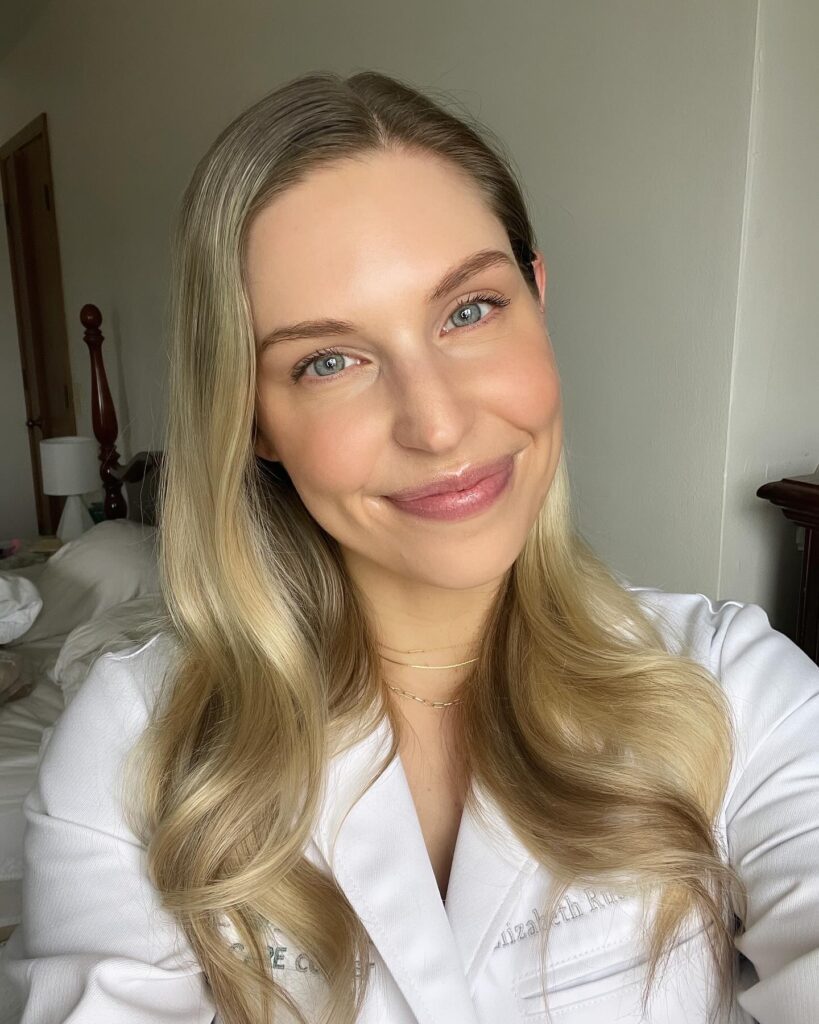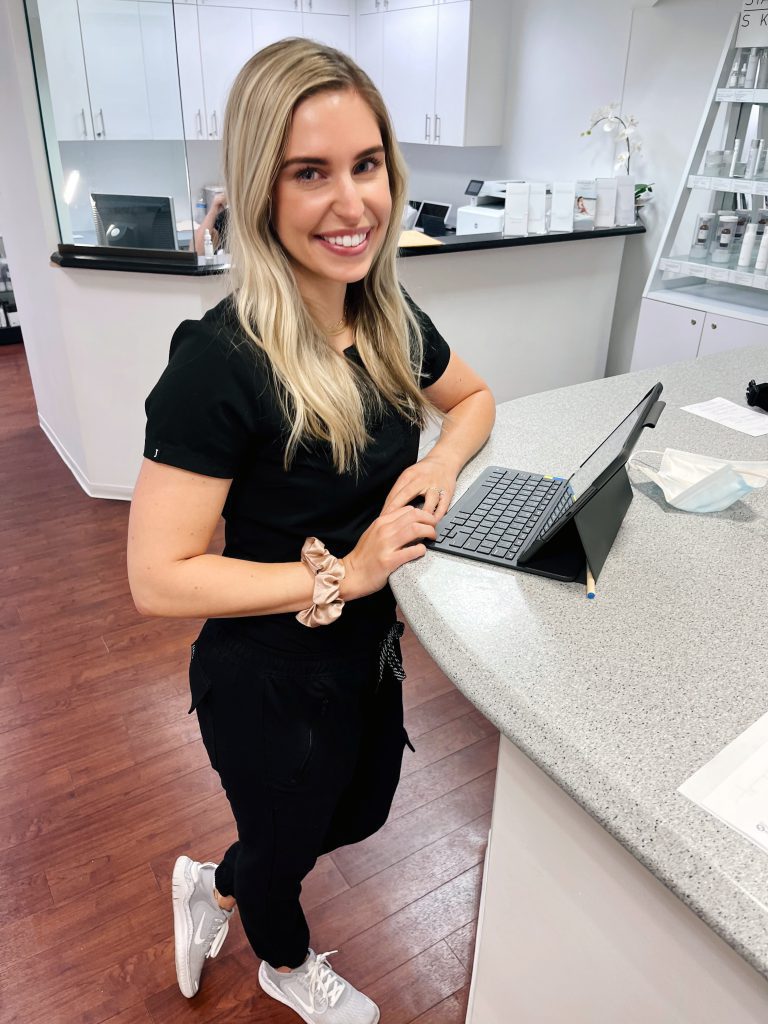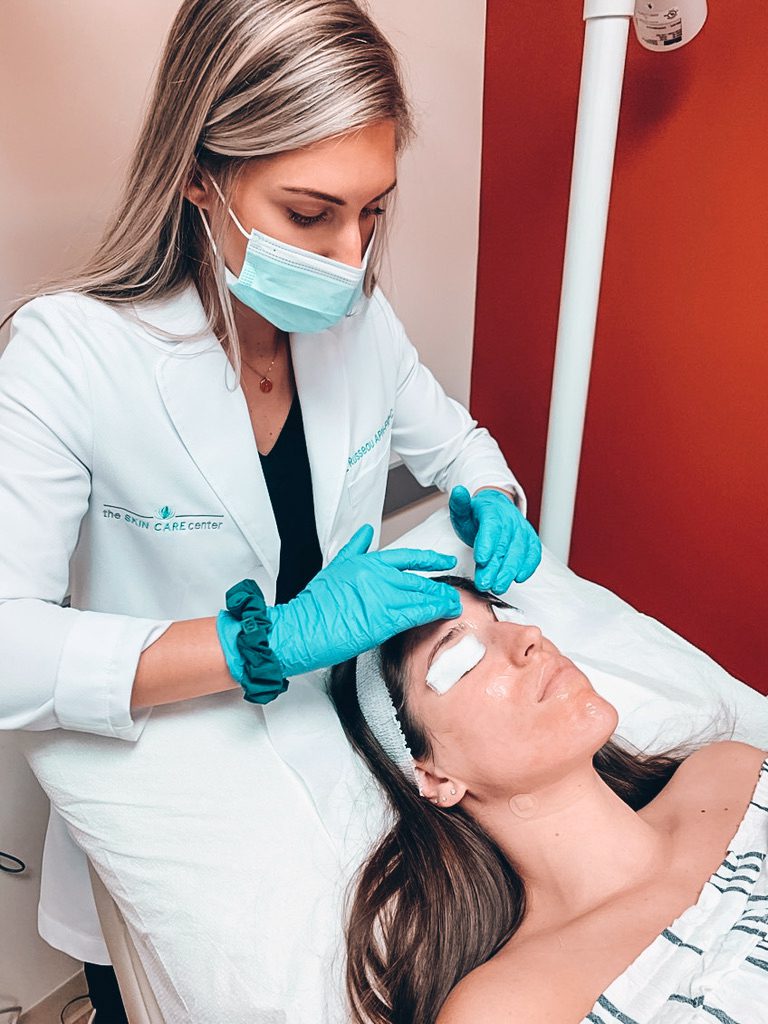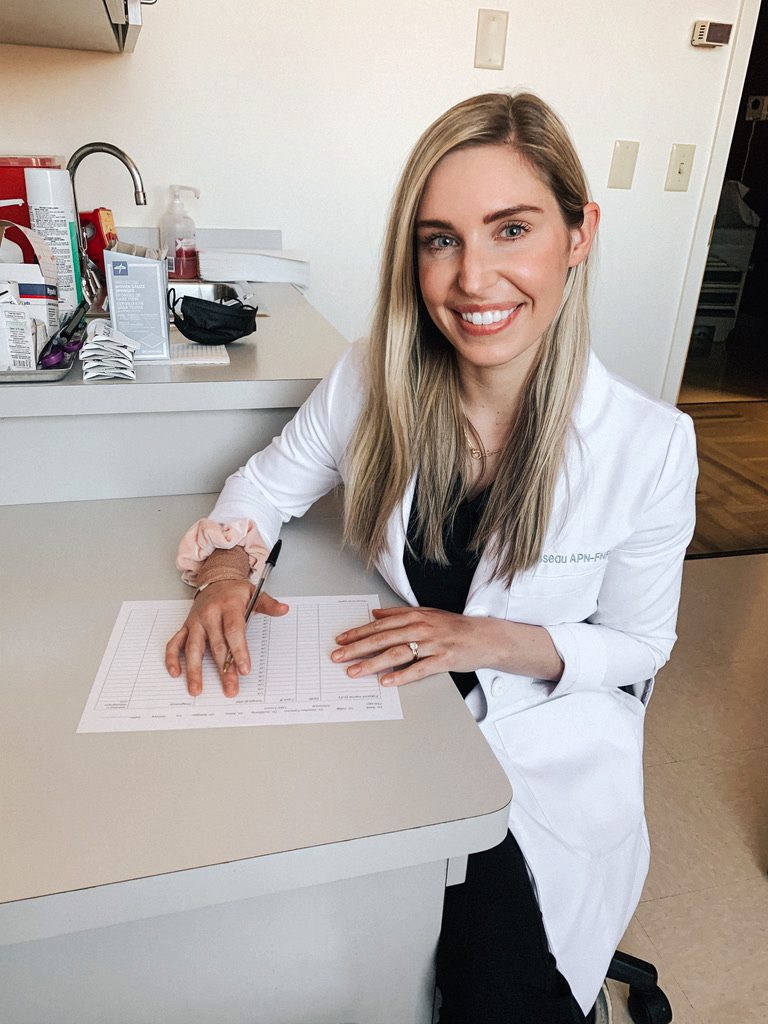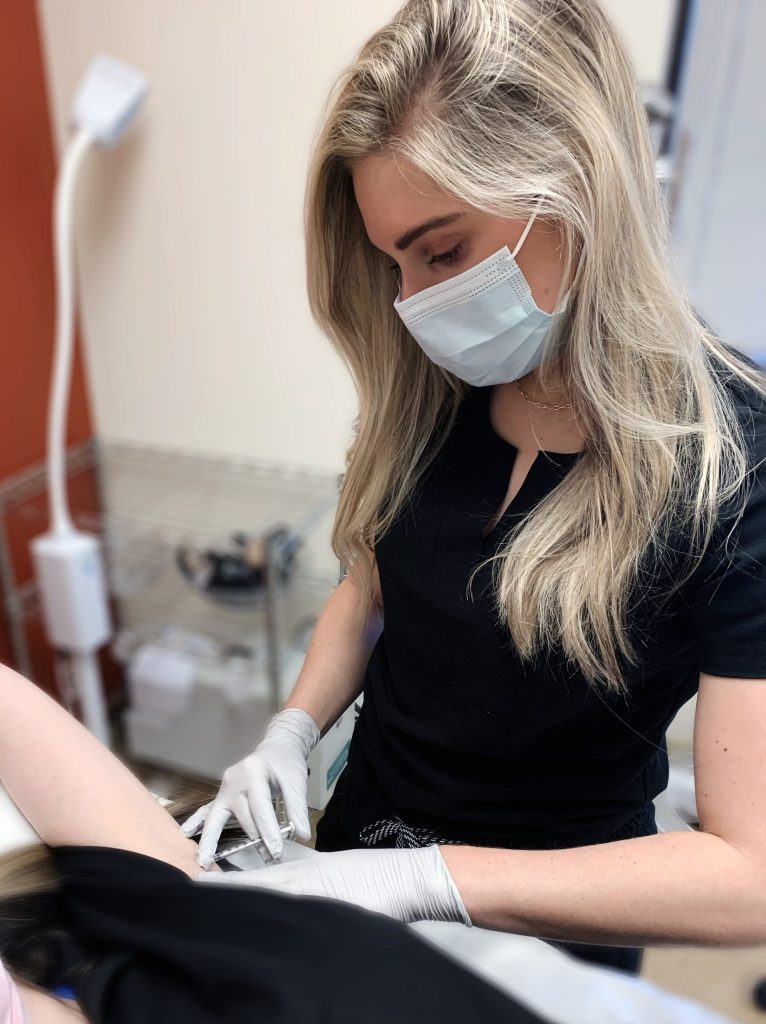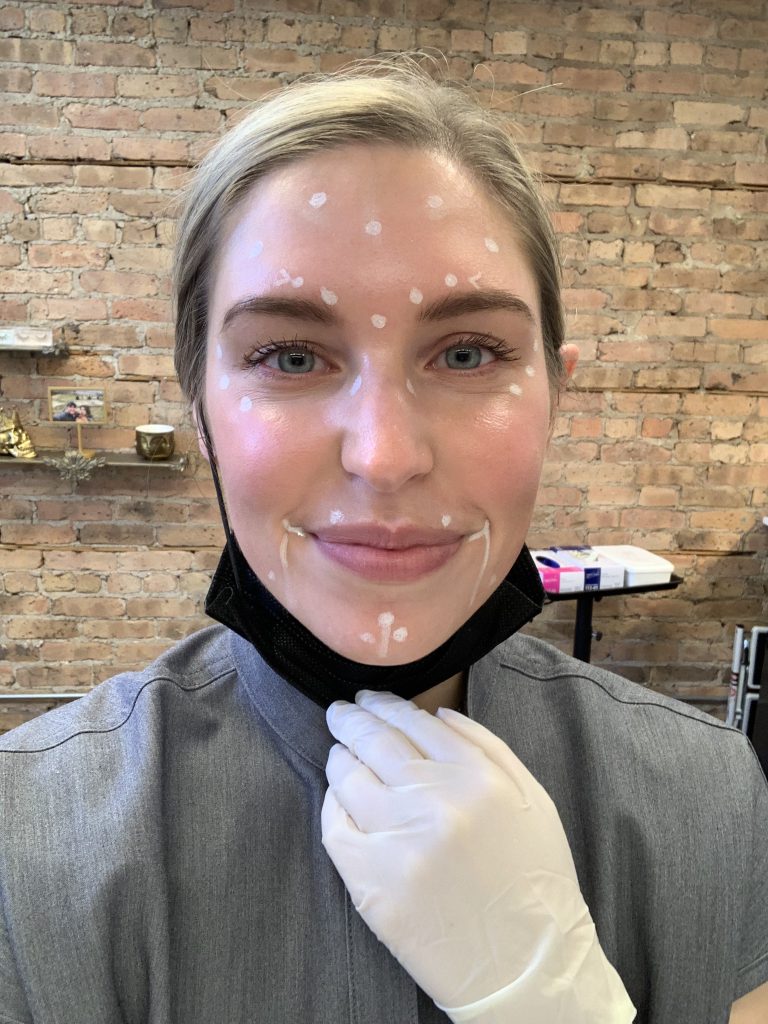Let’s talk skincare basics during pregnancy – there’s A LOT of information out there and it can be confusing and overwhelming to dissect. Overall, there are a lot of effective ingredients that you can feel confident about using, only a few to avoid, and some more “controversial” ingredients that we’ll get into.
Ingredients to Avoid
- Vitamin A derivatives including oral isotretinoin and topical retinoids or retinol. Oral Isotretinoin or Accutane can cause birth defects in women that become pregnant while taking this medication. This medication is highly regulated because of this and strict precautions to avoid pregnancy while taking are required. Because of this known risk, all topical formulations of retinoids (including tretinoin, adapalene, retinol, retinaldehyde, etc.) should be avoided.
- Hydroquinone is a topical bleaching agent that is often used for melasma or hyperpigmentation. There are some reproductive studies in animals that have shown to have some adverse effects on the fetus. We also know that topical hydroquinone can be absorbed systemically through the skin, and theoretically be passed onto the fetus. Well controlled human studies are lacking, but because this topical is primarily used for cosmetic purposes, its use is not recommended during pregnancy.
- Minoxidil or Rogaine for hair thinning/loss should be not be used during pregnancy. There are some reproductive studies in animals that show some harm to the fetus. Well controlled human studies are lacking, but because this is primarily used for cosmetic purposes, its use should be avoided.
- Oral spironolactone is a prescription medication that is often used to treat hormonal acne. Its anti-androgenetic properties pose a potential risk to a male fetus, so it should not be taken in pregnancy and should be discontinued if you are trying to conceive.
Ingredients that are Dose Dependent
- Salicylic acid. In general, it is recommended to avoid products with salicylic acid higher than 2%. Salicylic acid available in over-the-counter products is 2% or less, so generally these topical products are considered safe to use. High strength salicylic acid and/or extensive use should be avoided. Chemical peels often use higher strength salicylic acid, so always inform your provider if you are pregnant so they are aware to avoid this.
- Glycolic acid. I recommend avoiding high strength glycolic acid. I recommend using 10% or less during pregnancy. Avoid products or peels with higher strength glycolic acid.
- For ingredients that are dose dependent, using a lower strength in limited areas is generally considered safe so many will use these in smaller amounts or in a wash off treatment, where less is likely to be absorbed. For example, using a salicylic acid 1% topical gel to spot treat an acne breakout occasionally or using a glycolic acid 5% cleanser 2x a week on your face.
Controversial Ingredients
- Chemical sunscreens. There is a lot of fear surrounding chemical sunscreen use in pregnancy. There is no study to date that shows any harm to mom or baby. However, some of the chemical filters have been found to be absorbed through the skin into their bloodstream. For this reason, some women prefer to stick to zinc oxide-based sunscreens instead; so, if this concerns you, this is an easy fix. There are many people that use chemical sunscreens during pregnancy with no issues. As always, I recommend chatting with your provider on an individual basis to choose the option that’s best for you and your family.
- Sulfur is an ingredient that is often used for acne, rosacea, and seborrheic dermatitis. It is pregnancy category C due to the fact that there is minimal data available, but no fetal harm has been documented. It is often used in small amounts and limited areas (for example – wash off treatments or spot treatment) during this period, as systemic absorption is minimal.
- Bakuchiol is often referred to as a pregnancy safe alternative to retinols/retinoids, however the data to back this claim is lacking. There is nothing to suggest that bakuchiol causes any harm to the fetus or mom, but standardized studies in this population are lacking.
Ingredients that are Considered Safe
- Antioxidants including vitamin C, vitamin E, or niacinamide. These would be great options to continue in your morning routine to protect against free radical damage, UV rays, and brighten the skin.
- Benzoyl peroxide. Benzoyl peroxide may be a great choice if you are struggling with acne or breakouts during pregnancy. It can be found over-the-counter from strengths 2%-10% and comes in a variety of forms including washes, creams, and masks.
- Azelaic acid. Azelaic acid is another great choice in pregnancy if you are struggling with acne, rosacea, and pigmentation. You can find it in serums or gels over-the-counter up to 10% and it also comes in a prescription strength product that are 15%-20%.
- Chemical exfoliants including alpha hydroxy acids and poly hydroxy acids. Common ingredients include lactic acid, mandelic acid, malic acid, tartaric acid, phytic acid, or glycolic (see above under dose dependent). In general, it is considered safe to use products with chemical exfoliants. As always, these should be used in moderation, approximately 1-3x a week depending on the product and your skin.
- Hydrating ingredients like hyaluronic acid, glycerin, petrolatum, etc. It’s considered to safe to continue any hydrating serums or your regular moisturizers.
- Topical peptides in skincare are amino acids or small proteins that may help to increase collagen production, improve the appearance of fine lines, improve skin elasticity, and visibly plump and hydrate the skin.
- Sunscreens are absolutely considered safe in pregnancy and are highly recommend to use on a regular basis. See above for more information on chemical sunscreens. If you are choosing to use physical/mineral sunscreens, look for a sunscreen that includes zinc oxide and titanium dioxide.
A couple other notes:
- We have a limited amount of strong data regarding skincare ingredients and their safety in pregnancy due to a lack of standardized studies in this population
- Timing matters. Gestation weeks 2 through 8 are the most critical for organ development. Medications taken during this time have the highest risk of causing birth defects.
- This breakdown is a summary of the common ingredients found in our skincare products. It is not an all-inclusive list and should not be taken as medical advice. As always, you should discuss any product use with your OB/GYN and dermatology provider.
- In most regimens, I recommend a gentle cleanser, antioxidant, sunscreen, moisturizer, and a chemical exfoliant a couple times a week. If you are struggling with any skin problems that are not controlled with OTC options available to you, you should always see your derm provider for evaluation and treatment.


